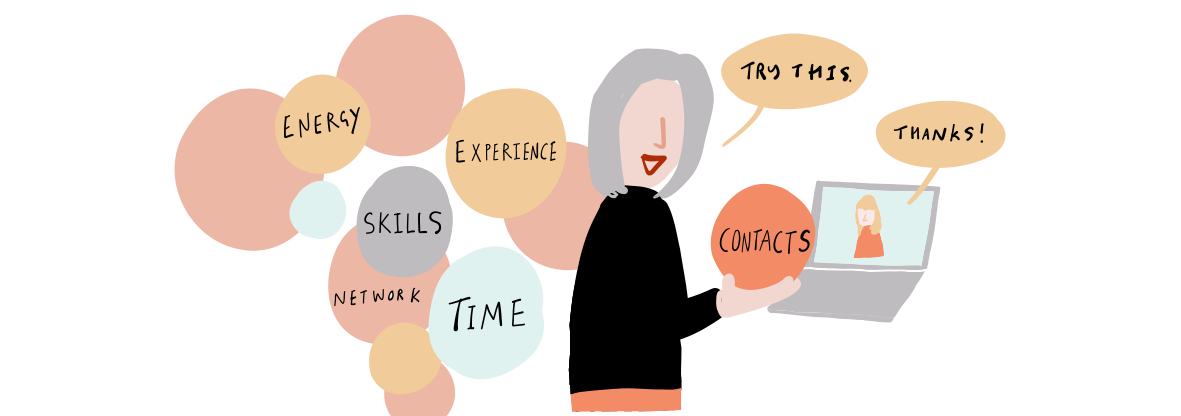What Is Peer Mentoring?

You may or may not have heard of peer mentoring but if you’re reading this blog post, someone has done or said something that has piqued your interest. So what is peer mentoring? Is this type of mentoring any different from traditional mentoring? You’re about to find out.
A peer mentorship involves a relationship between people who share similar experiences, ages, or statuses, where they offer each other support, guidance, and motivation. It aids mentees in their growth by giving them guidance, sharing expertise, and offering emotional support. Mentors play a crucial role in guiding their mentees by providing inspiration, assisting them in overcoming obstacles, setting objectives, and acquiring new abilities.
Peer-to-peer mentoring cultivates a feeling of togetherness, empowers people, and encourages self-improvement by sharing information, assistance, and advice among peers. It’s a win-win situation where everyone grows and learns together.
What Is a Peer Mentor?
A peer mentor is someone who is more experienced in a particular field and is comfortable offering others some guidance in that area too! They give attention, support, skills and all that good stuff! There are certain skills you need to be a peer mentor. If you can tick the following boxes, you can be a peer mentor:
Patience – A Lot of It
Growth takes time. If you know this, you’d understand when your mentees experience setbacks and have difficulty processing information. You know – because you’ve been there.
A patient mentor won’t give up and will consistently offer encouragement all through the mentoring journey. It’s like nurturing a plant – you give it time, care, and nourishment, knowing that it will eventually blossom into something beautiful.
Empathy
The whole idea is to match individuals who have walked in each other’s shoes or faced similar situations.
Just imagine yourself in their shoes, empathise with their feelings, and you’re on your way to making a meaningful connection. It’s like slipping into a comfortable pair of sneakers that fit perfectly.
Active Listening Skills
Mentees want someone who truly listens and understands them. So, make sure to give them your full attention and tune in to their concerns, ideas, and goals. They want someone who listens and understands them.
Being a good listener doesn’t mean you have to agree with everything your mentee says. Your role as a peer mentor involves helping them through challenges and finding suitable solutions, understanding and making sense of various perspectives, even if they seem conflicting, and offering many options to consider.
Commitment
Building a relationship such as a mentor-mentee relationship takes commitment. You need to be ready to be there for someone for an extended period. Set times for meetings and show up. Let your mentees know they can count on you.
Problem Solving
Problem solving in a peer mentorship is all about identifying and tackling problems head-on. You’ll play a crucial role in helping people overcome obstacles in their professional journeys. When your mentee gets stuck, you’re there to help them navigate through the twists and turns.
You’ll brainstorm together, tossing ideas like confetti and finding creative solutions. It’s all about using your superhero problem-solving powers to save the day. So, put on your thinking cap (or suit) and get ready to be the mentee’s trusty problem-solving…person.
Ability to Set Boundaries
As a peer mentor, set boundaries, respect boundaries and maintain confidentiality. You should create a safe and trusting environment where your mentee feels comfortable sharing without fear. Of course, there are limits to what should be shared.
So long as it’s career-related, it’s okay. Set clear limits and make sure they know what’s cool and what’s not in your mentoring dynamic. And when it comes to confidential stuff, zip those lips and lock it up tight!
Benefits of Peer Mentoring
As you’re still reading this, you’re really digging into the idea of becoming a peer mentor. Here are some other great benefits to peer mentoring:
Improved Skills
Certain soft skills are very valuable in the workplace. Being a peer mentor offers you the chance to develop your communication skills, active listening, empathy, and coaching.
If rising to leadership levels is something you have on your list, what better way to get started than to inspire and motivate others on their journey as a peer mentor?
Building Connections
Everyone needs someone they can build meaningful bonds with. One of the many benefits of peer mentoring is the relationships it fosters. Mentees can find someone who understands their challenges and dreams, while mentors can lend a hand to someone who needs it by sharing their own experience and helping them navigate their careers.
Reinforcement of Knowledge and Skills
Think of your knowledge and skills as a muscle. When you mentor others, it’s like going to the gym and working out that muscle.
As you explain concepts, answer questions, and share knowledge with your mentee, you strengthen your knowledge and skills the same way lifting weights strengthens your muscles. It’s a win-win situation; you help them grow while reinforcing your understanding of something.
Personal Fulfilment
There’s nothing quite like the feeling of seeing someone’s face light up with the realisation that they’re on the path to success, all thanks to your guidance. Pause and reflect on that idea for a moment. Yeees. There’s nothing quite like the rush of knowing you played a role in someone else’s triumph.
Peer Mentoring Misconceptions
There are a handful of misconceptions surrounding peer mentorships. Let’s debunk some of them:
1. Mentors Have All the Answers
Hate to break it to you but they don’t. In reality, they aren’t expected to be infallible experts. They have successfully walked the path you’re currently on and have learned a thing or two on their journey that they feel might help you get through yours. Your relationship is one of collaboration where you learn from one another and discover solutions together.
2. Peer Mentors Must Be Older or More Experienced
It’s called “Peer Mentoring” for a reason. Peer mentors are usually equal in age and experience. Remember that this type of mentoring is based on shared experiences and relatability; they have recently gone through similar hitches in their careers and can provide you with valuable information and guidance because of that.
3. Peer Mentoring Is Only for Academic Purposes
Peer mentoring can be moulded to fit any situation. Its versatility is truly remarkable. By creating a supportive network of peers, people can enhance their personal growth and well-being in various areas of life.
Career Navig8r wouldn’t be here if peer mentoring was restricted to academics. Yes, it’s mostly used in educational settings to support students but it can be used in many other contexts and we are proof.
Peer Mentoring vs. Traditional Mentoring
Peer mentoring has unique advantages that sometimes make it a better option than traditional mentoring. Let’s check them out:
Similarities
Peer mentoring involves mentors and mentees who have similar experiences, obstacles, and backgrounds. Individuals can often connect with one another on a deeper level when they’ve encountered similar circumstances.
Typically, in traditional mentoring, there exists a notable difference in experience levels, where the mentor holds a much higher degree of knowledge and proficiency in a specific domain or subject matter.
Power Dynamics
There is usually an uneven distribution of power in traditional mentoring, with the mentor holding more sway and control over the mentee. Peer mentoring is based on a more equal power dynamic, allowing both parties to share knowledge and benefit from each other’s experiences.
Learning from Each Other
When it comes to traditional mentoring, the main emphasis is on the mentee’s progress and advancement. The mentor plays a crucial role in offering direction, expertise, and encouragement.
On the flip side, peer mentoring is like a two-way street of knowledge. Mentors learn from mentees, and mentees learn from mentors. It’s like an exchange program where everyone comes out smarter and more enlightened.
Getting Started as a Peer Mentor
To make sure your peer mentoring relationship is on point, you have to set some goals, keep it real, and make sure you’re both in it to win it. No slacking off.
If you want to be a top-notch peer mentor, get ready for some serious check-ins, problem-solving sessions, and feedback galore!
Since you’re still reading (almost there now), it’s time to think about becoming a peer mentor. Just think about all the stuff you’re good at and what you feel confident sharing with others. Once you’ve got that out of the way, search for opportunities to connect with potential mentees.
Our platform is THAT platform. You can take the first step today.
Become A Career Navig8r
Peer mentoring is an incredible opportunity to learn, grow, and support one another. It can open doors to new possibilities even at your workplace.
As a peer mentor, you have the opportunity to make a difference in someone’s life. Isn’t that great? Sign up now and join our growing community of Career Navig8rs.


